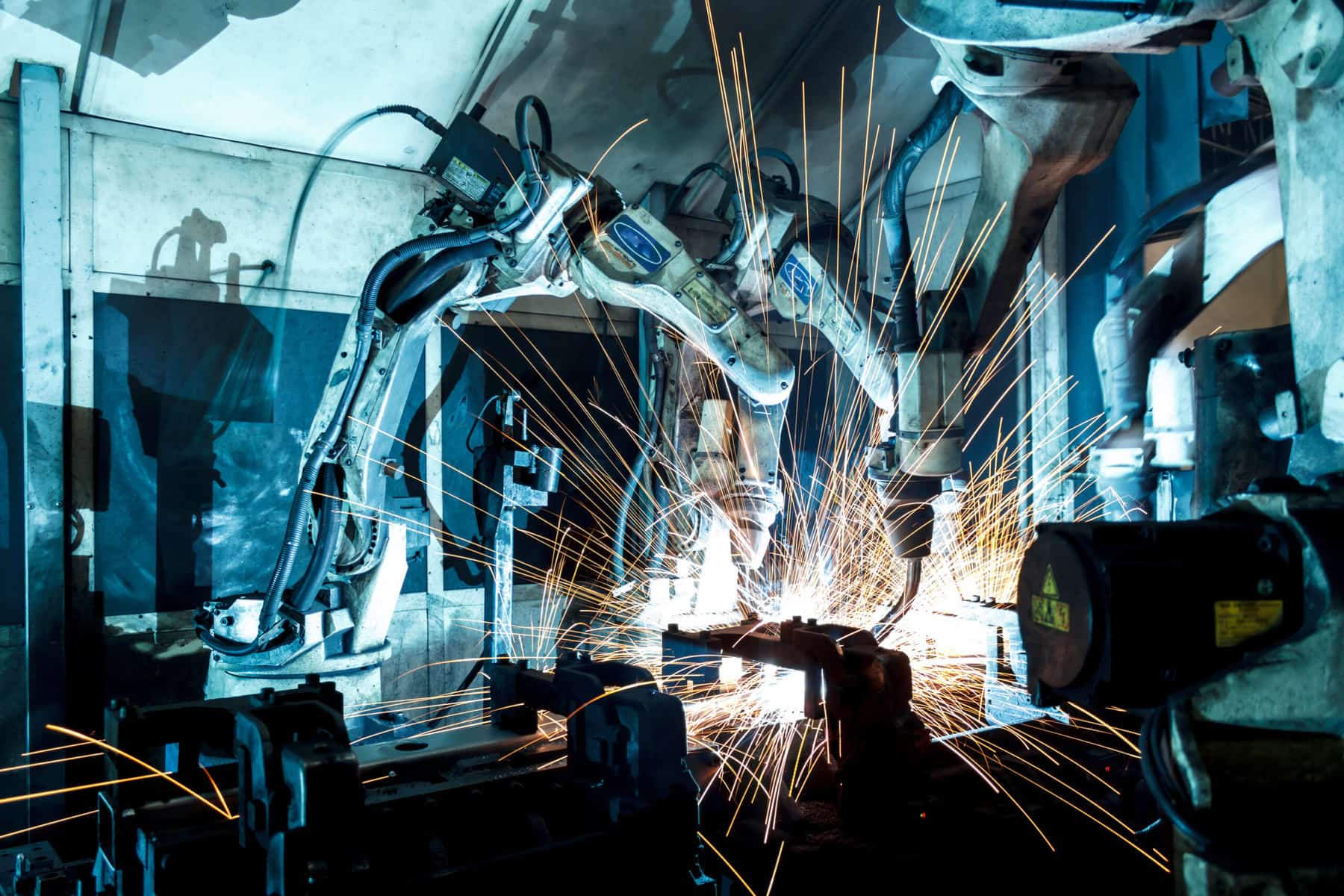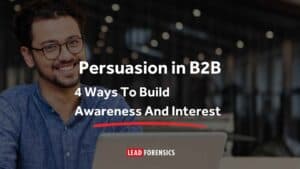But the question arises: How do you make your machinery the first choice in an increasingly competitive and digitally-driven market?
This question underscores the vital role of marketing in the machinery industry. In an industry where the competition is fierce and the stakes are high, getting your message across to the right audience, at the right time, can be the defining factor for your business’ success.
Marketing in the machinery industry comes with its own set of unique challenges. The technical nature of the products, the typically long sales cycles, the need for considerable buyer trust, and of course, the ongoing shift from traditional to digital marketing, all combine to make marketing for machinery manufacturers a tough nut to crack…
But fear not, because we’re here to help you tackle these challenges head-on!
In this blog post, we will delve deep into the fundamentals of marketing specifically tailored for machinery manufacturers. We’ll cover everything from understanding your audience, the importance of a strong online presence, harnessing the power of content and social media marketing, to direct communication strategies including email marketing.
We’ll also discuss the critical role of lead generation and conversion and how to measure your success and ensure your marketing initiatives are providing a strong return on investment.
If you’re ready to elevate your machinery business and take the marketing world by storm, let’s roll up our sleeves and get started!
The Changing Landscape of Machinery Marketing
The marketing landscape within the machinery industry has experienced some profound shifts over the past few years.
Gone are the days when print ads, trade shows, and direct mail were the primary mediums for reaching potential clients. Today, machinery marketing, much like every other industry, is rapidly embracing the digital revolution, fundamentally transforming the way businesses reach out to and interact with their audience.
The shift from traditional to digital platforms was initially gradual, spurred by technological advancements and the changing consumer behavior. But recent history, such as the pandemic, have accelerated this digital transition, making it clear that an online presence isn’t merely optional anymore – it’s absolutely vital for survival and growth. Now, more than ever, businesses need to have a robust digital marketing strategy in place.
This transition to digital platforms does bring benefits to machinery manufacturers. For starters, it opens the door to a global audience. No longer are you restricted to your immediate geographical area; your potential customer base now spans continents. It’s now possible for a machinery manufacturer in Germany to sell effectively to a construction company in Australia, thanks to the global power of digital marketing.
Digital platforms provide the ability to deliver targeted marketing like never before. Using tools like SEO (Search Engine Optimization), PPC (Pay-Per-Click) advertising, and social media marketing, you can reach out to specific demographic segments, industry verticals, or even individual companies. It’s an unparalleled opportunity to put your machinery products in front of the right people, at the right time, with the right message.
Perhaps one of the most compelling benefits of this digital evolution is the ability to make data-driven decisions. With traditional marketing, it was always challenging to measure the effectiveness of a campaign or track the buyer’s journey. But digital marketing brings with it an abundance of data.
Through tools like Google Analytics and Lead Forensics, you can gain detailed insights into how users interact with your website, what content resonates with them, where they’re coming from, and a lot more. This data empowers you to continuously refine your marketing strategies and ensures your marketing efforts yield the best results.
In the next sections, we’ll delve into more specifics on how to leverage these digital tools and strategies. So let’s dive in and explore this brave new world of machinery marketing.
Understanding your Audience
Imagine going on a blind date, only knowing that the person you’re meeting loves food but not knowing whether they’re a vegetarian, a steak lover, or a fan of spicy Thai food. Your chances of picking the perfect restaurant would be pretty slim, wouldn’t they?
That’s what it’s like marketing your machinery without a clear understanding of your audience. Knowing your target market inside out is a cornerstone of any effective marketing strategy. It’s essential to understand not only who your potential customers are but also their needs, their challenges, and how your machinery can help solve them.
Identifying potential customers in the machinery industry often means looking at businesses within specific industries that have a need for the type of machinery you manufacture. For instance, if you produce woodworking machinery, your potential customers could be furniture manufacturers, carpentry businesses, or even schools with strong woodworking programs.
But knowing who might need your machinery is just the first step. To truly connect with your customers, you need to delve deeper and understand their specific needs. Do they value efficiency above all? Are they looking for machinery that can handle large-scale projects or something suitable for smaller, precision tasks? Answering these questions will allow you to tailor your marketing message to highlight the most important features and benefits to your audience.
Market research plays a crucial role in uncovering these insights. Through methods such as surveys, interviews, and data analysis, you can gain a wealth of information about your target market. You can learn about their buying behavior, their preferences, their budgets, and more. You can even gain insights into your competitors and what they’re doing to attract customers.
Creating customer personas is another effective way to define your target audience. These are semi-fictional characters that represent your ideal customers. For instance, you might have a persona for a small business owner who values affordability and customer service, and another for a procurement manager at a large corporation who values efficiency and long-term ROI. These personas can guide your marketing strategy, helping you develop targeted campaigns that speak directly to the people you want to reach.
Bonus tip: Lead Forensics can also play a pivotal role by providing in-depth insights about your website visitors. With its powerful tracking and identification capabilities, you can identify who is visiting your website, even if they don’t fill out a form or make an inquiry.
Understanding your audience is like having a roadmap for your marketing efforts. It shows you where to go, what to say, and how to say it. And with this roadmap in hand, you’re ready to embark on your marketing journey with confidence and clarity.
The Power of a Strong Online Presence
It’s a cliche, but it helps to think of your website as your digital storefront. In the same way that you’d want your physical store or office to be clean, organized, and inviting, your website should be professional, easy to navigate, and engaging. After all, it’s often the first point of contact between your business and potential customers, and we all know how much first impressions matter!
Creating a professional website goes beyond just aesthetics. It’s about showcasing who you are, what you do, and how you can help your potential customers. Make sure your website provides clear, concise information about your machinery, its features, and benefits. Include high-quality images or even videos of your machinery in action. The easier it is for potential customers to find and understand this information, the more likely they are to consider your machinery for their needs.
Now, having a great website is a crucial first step, but it’s not much use if people can’t find it. That’s where search engine optimization, or SEO, comes in. In simple terms, SEO is the process of making your website more visible in search engine results, like Google. It involves a variety of techniques, such as using relevant keywords in your content, optimizing your site’s loading speed, and ensuring your site is mobile-friendly.
Think about it this way… when you’re looking for a new restaurant to try out, you’re likely to choose one of the first few options that appear in your search results, right? The same goes for your potential customers. The higher your website ranks in search results, the more likely people are to visit it. And that’s what SEO is all about – getting your website to the top of those search results.
For machinery manufacturers, local SEO can be particularly beneficial. Local SEO is all about making your business visible to people searching in your specific geographical area. For instance, if a company in Houston is searching for ‘machinery manufacturers near me,’ local SEO techniques will help your business appear in these search results if you’re in the vicinity. It’s a powerful way to attract local businesses and strengthen your reputation within your local community.
By combining a professional, user-friendly website with strategic SEO techniques, you can build a strong online presence that not only attracts potential customers but also establishes your machinery business as a trusted, reliable option in the industry.
Content Marketing: Showcasing your Expertise
Picture this: You’re browsing through a machinery manufacturer’s website, and you stumble upon a series of blog posts discussing the latest industry trends, a detailed white paper about efficient production techniques, and case studies showing real-world applications of their machinery. What would your immediate impression of this manufacturer be?
Chances are, you’d perceive them as an expert in their field, a trusted source of information, and possibly, a potential partner for your machinery needs. That is the power of content marketing.
In an industry as technical and complex as machinery manufacturing, providing informative, engaging content can set you apart from your competitors. This could take the form of blog posts discussing industry trends, white papers diving into technical topics, case studies showcasing your machinery’s success stories, or even tutorial videos demonstrating how to use your equipment.
Content marketing serves a dual purpose. Firstly, it helps to establish you as an industry expert, which builds trust with your audience. When potential customers see that you understand their challenges and can provide valuable insights, they’re more likely to consider you when they need machinery.
Secondly, high-quality content enhances brand recognition. When your content gets shared on social media, cited in industry publications, or even just passed around in office emails, it boosts your brand’s visibility. The more people see your content, the more recognizable your brand becomes, leading to higher recall when they’re in need of machinery.
But how can you make your content more engaging and shareable? Here are a few tips:
- Understand Your Audience: Your content should resonate with your audience’s needs and interests. Use your customer personas and market research to guide your content creation.
- Make It Valuable: Whether it’s a how-to guide, an in-depth analysis, or a simple industry update, your content should provide value to the reader. They should walk away feeling that they’ve learned something new.
- Keep It Simple: Even the most technical subjects can be made accessible with clear, straightforward language. Remember, your goal is to engage your audience, not overwhelm them.
- Use Visuals: Images, infographics, and videos can make your content more engaging and easier to digest.
- Include a Call-to-Action: Encourage your readers to share your content, subscribe to your newsletter, or contact you for more information.
With these tips in mind, you’re ready to start showcasing your expertise through content marketing. One last tip: Lead Forensics can help you understand what kind of content drives the most traffic to your website, enabling you to refine your content strategy and get the most out of your efforts.
Email Marketing: Direct Communication
Have you ever heard the saying, “The money is in the list”? In the world of digital marketing, that ‘list’ refers to your email subscriber list. And this saying holds lots of truth in the machinery industry.
Despite the rise of social media and other digital platforms, email remains one of the most effective channels for direct communication with your customers. It’s like having a direct line to their inbox, a place they likely visit multiple times a day. Plus, people who have opted in to receive your emails have already shown an interest in your machinery, making them highly qualified prospects.
Here are a few tips to help you create an effective email marketing campaign:
Personalization: With today’s email marketing tools, you can do more than just address your customers by name. You can tailor your emails based on what you know about them – their industry, their previous purchases, their browsing behavior on your website, and more. This makes your emails more relevant and engaging.
Segmentation: Not all customers are the same, and neither should your emails be. Segmenting your email list allows you to group your subscribers based on certain criteria (like their location, job title, or buying behavior) and send them content that’s specifically relevant to them.
Automation: Email automation tools can help you send the right message at the right time. For example, if a potential customer visits a particular page on your website, you can automatically send them an email with more information about that machinery.
But how do you know if your email marketing is working? That’s where metrics come in. Key metrics to track include open rates (how many people are opening your emails), click-through rates (how many people are clicking on the links in your emails), and conversion rates (how many people are taking the desired action, such as making a purchase or filling out a form).
Top tip: Boost your metrics by including engaged website visitors in your lists.
By leveraging personalization, segmentation, and automation, you can create email campaigns that not only engage your audience but also drive results for your machinery business.
Lead Generation and Conversion with Lead Forensics
Lead Forensics website visitor identification software that gives you crucial insights about who’s visiting your website, even if they never fill out a form or make a direct inquiry.
Think about it. You’ve put all this effort into your website, your SEO, your content, and your email marketing, and you’re getting a good amount of traffic to your website. But what happens to those visitors who don’t immediately convert into leads? Are they lost forever? Not with Lead Forensics…
Lead Forensics works like your digital detective, identifying those anonymous website visitors and providing valuable information such as their business name, contact details, and their journey on your website. Imagine the possibilities! You can see which products or services they’re interested in, where they’re based, and more. This information is invaluable for not only understanding your current audience but also uncovering potential new markets and audiences.
When it comes to lead generation, Lead Forensics can supercharge your efforts. With its real-time alerts, you’ll know immediately when a potential lead is on your site, allowing you to follow up promptly and effectively.
The power of Lead Forensics goes beyond straightforward lead generation. It also plays a crucial role in lead nurturing and conversion. By knowing more about your leads – their interests, their needs, their behavior – you can tailor your communications to meet those needs, nurturing them along the path to conversion. You can follow up with personalized emails, invite them to relevant webinars or events, or simply give them a call to discuss how your machinery can solve their problems.
With its detailed reporting capabilities, Lead Forensics helps you measure the effectiveness of your marketing efforts and make data-driven decisions. You can see which marketing channels are driving the most traffic, which pieces of content are most engaging, and which areas of your website are most effective in converting visitors into leads.
In a nutshell, Lead Forensics is basically a machinery manufacturer’s best friend, helping you identify, understand, and connect with potential customers in a more meaningful and effective way. It’s about making the most of your digital marketing efforts and turning your website into a lead-generation machine!
And with the information you gain from Lead Forensics, you can continue to optimize and refine your marketing strategy, ensuring that your machinery business continues to grow and thrive in the ever-changing digital landscape.
Conclusion
As we’ve explored in this blog post, the machinery industry is undergoing a significant shift. Traditional methods of marketing are making way for more advanced, data-driven approaches that maximize reach, engagement, and conversion.
From understanding your audience to establishing a strong online presence, utilizing social media, creating engaging content, leveraging email marketing, and capitalizing on lead generation tools like Lead Forensics – each aspect plays a critical role in shaping a comprehensive and effective marketing strategy.
Embracing this digital transformation may seem daunting, but remember: it’s not about doing everything at once. It’s about taking steady, informed steps toward a more digital, data-driven future. And the best part? You don’t have to do it alone. With tools like Lead Forensics, you can gain valuable insights, optimize your efforts, and ultimately, achieve better results.
Why Not Try Lead Forensics?
Curious about how Lead Forensics can transform your machinery marketing efforts? We encourage you to give it a try. With its robust features and real-time reporting, you’ll be amazed at the insights you can gain and the impact it can have on your lead generation and conversion.
For more information, don’t hesitate to reach out. Our team is always ready to answer your questions and help you discover how Lead Forensics can support your marketing strategy.
Finally, if you found this blog post useful, why not subscribe to our blog for more insights? And if you know someone else who might benefit from this post, we’d appreciate it if you’d share it with them.
Thank you for reading, and here’s to your success in machinery marketing!











Utilizing Social Media to Boost Visibility
Whoever said that social media and B2B machinery don’t mix, clearly hasn’t seen the (actually pretty cool) videos of manufacturing processes, the impressive before-and-after project photos, or the engaging discussions happening in industry-specific LinkedIn groups. In the digital age, social media has become an invaluable tool for machinery manufacturers looking to boost their visibility and connect with their audience.
Social media platforms offer machinery manufacturers a unique opportunity to not only showcase their products but also tell their story. These platforms enable you to demonstrate your industry expertise, share updates about your business, and engage directly with customers and prospects. Plus, they are an excellent channel for customer service and feedback.
Different social media platforms offer different advantages, and it’s essential to understand these to leverage each platform effectively.
LinkedIn, often considered the go-to platform for B2B marketing, can be a goldmine for machinery manufacturers. It’s a fantastic platform to share industry insights, network with professionals, participate in relevant groups, and establish your business as a thought leader. You can share content about your latest machinery, industry trends, case studies, and more.
Instagram and Facebook, on the other hand, are excellent platforms for showcasing your machinery in action. You can share photos and videos from your production line, highlight before-and-after scenarios from your customers, and even give behind-the-scenes peeks into your company culture. These platforms are more visual and are great for storytelling.
Let’s consider an example of a successful social media campaign in the machinery industry. Caterpillar, one of the world’s leading machinery manufacturers, launched the #BuiltForIt campaign, where they showcased their equipment performing challenging tasks in visually stunning scenarios. The videos not only highlighted the robustness of their machinery but were also highly shareable, resulting in increased brand visibility and engagement.
The key to success with social media marketing lies in understanding your audience, providing valuable and engaging content, and being consistent. Remember, social media is not just about selling; it’s about creating connections, sparking conversations, and building relationships.
And don’t forget that platforms like Lead Forensics can help you track the effectiveness of your social media campaigns by identifying leads that visit your website after engaging with your social media content. This can provide valuable insights for refining your social media strategy and boosting your visibility even further.